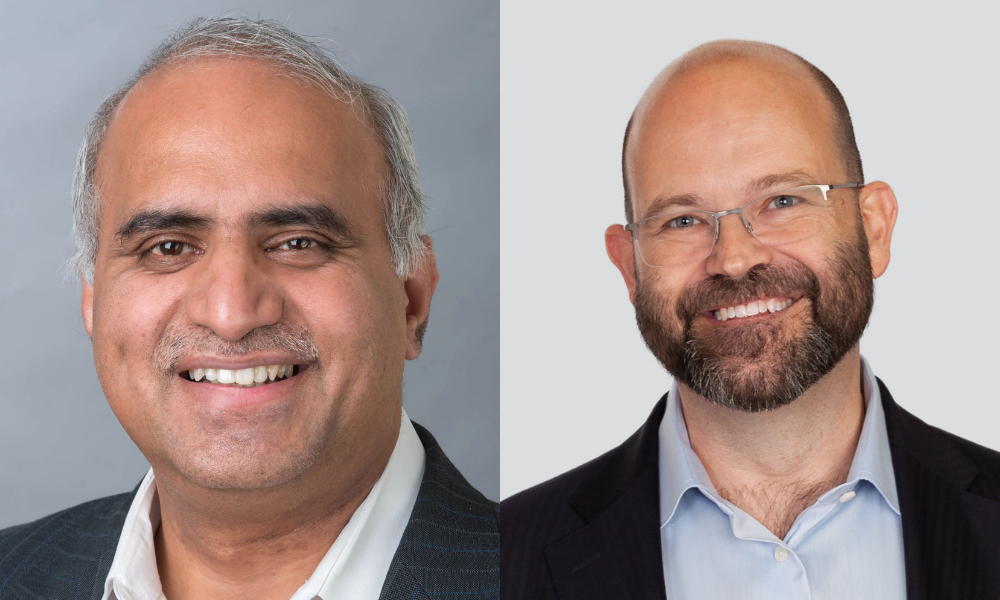Experts say rising demand for specialized advice and alternative investments will transform the landscape

After a year of volatility and ramped-up economic challenges, the long-running trends toward personalized advice, differentiated solutions, and technological advancement in the wealth space is set to reach fever pitch in 2023, according to two industry experts.
“Investors are looking for real advice, and a lot of it at this time,” says Nilesh Vaidya, EVP & global industry head for Retail Banking & Wealth Management at Capgemini (pictured above, left). “Advisors have to figure out how to deliver it given their limited time and the size of their teams.”
Vaidya says the variety of advice that advisors have to deliver has swelled exponentially. Aside from addressing different objectives such as retirement income or wealth accumulation, today’s advisors now have to consider questions from client groups with unique needs. In its recent World Wealth report, Capgemini found groups like women investors, LGBTQ clients, and technopreneurs were emerging niches for wealth firms in North America.
“In 2022, we saw a gradual tilt away from traditional public markets, and into private asset classes,” adds David Bardsley, head of Wealth & Asset Management Advisory at KPMG in Canada (above, right). “I think as investment portfolio performance softens from where it was previously over the last 10 years, we’ll see both product and service models change.”
The dampened outlook for performance also implies greater cost-consciousness among consumers, which will require asset managers to revisit their fee models. With investors’ confidence in traditional fixed income and equity markets impacted, Bardsley also expects portfolio allocations worldwide to broaden into real estate, infrastructure, and private credit – medium-risk asset classes that would be a good fit for long-term investors.
“Not every asset manager has the capacity to deploy capital into those spaces, so we’re seeing participants actively looking to acquire capabilities in infrastructure, real estate, and private credit products,” he adds. “Advisors and wealth firms are also looking at their product shelf differently today than they did just 12 or 18 months ago … they see product differentiation as a way to win the hearts and minds of investors.”
Bardsley is also expecting a revival in the fixed-income space, given the dramatic rise in interest rates over the past year.
In 2021, total investment in wealth tech around the world reached approximately US$8.8 billion. That was driven by significant growth in high-net-worth clients; today, Bardsley says around 23 million high-net-worth individuals are being serviced by wealth providers globally.
“Between now and 2030, wealth revenues are expected to double from US$250 billion to US$510 billion,” he says. “There’s naturally a lot of interest in finding ways to lean into that market, and service it differently and more effectively.”
Globally, Bardsley says wealth firms are introducing more elegant, efficient trading platforms for consumers to directly access public markets. Platforms for investments in alternative assets, including real estate, private equity, and digital assets, are also on the rise.
“In our conversations with investors, we’re seeing a strong appetite for digital assets,” Vaidya says. “Despite the setbacks we’ve seen in the crypto market today, we believe that trends like fractionalization and tokens that are backed by real assets are likely to continue over the long run.”
According to Vaidya, large banks in Canada and around the world are also stepping up the digitization of their front-office capabilities, as well as simplifying their middle and back offices to provide a better end-to-end experience for clients.
“That wave isn’t just happening at the large Canadian banks. We’re also seeing it among advisors,” he says. “The need for hybrid service is increasing as clients’ demand for advice accelerates.”
While a truly effective hybrid advice model may be difficult to deliver in the mass affluent market, Bardsley is expecting the second wave of digital advisory capabilities will wash over the wealth space in the next 12 months.
“We’re moving away from what was traditionally just a set of algorithms provided by robo-advisors, to something that’s much more informed by a client’s personal circumstances,” Bardsley says. “As the industry increasingly adopts AI and machine learning into their processes and systems, I think the capacity to provide will change and evolve.”



